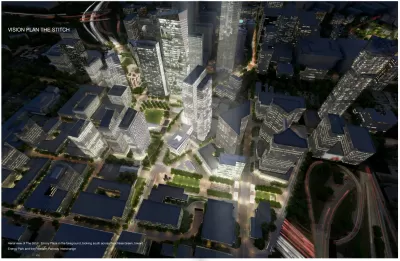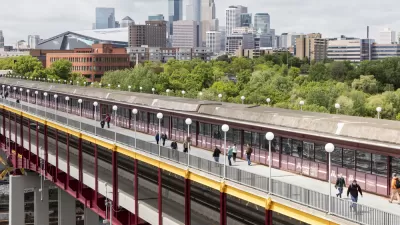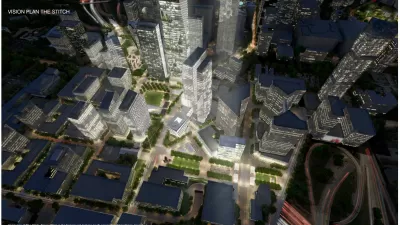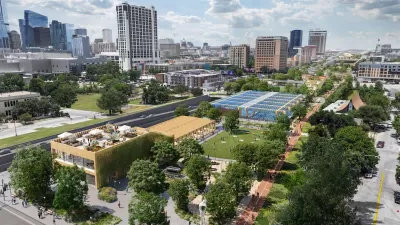A trio of freeway cap proposals around the country—in St. Paul, Atlanta, and Austin—embody the potential of infrastructure change to undo the mistakes of the past.

Adina Solomon writes a summary of a recent ULI webinar hosted by the Curtis Infrastructure Initiative in provided information on the status and ambitions of three freeway cap projects, located in Atlanta, Austin, and St. Paul.
According to the premise of the webinar, COVID-19 and the ongoing civil unrest in response to recent police violence have renewed concerns about the legacy of land use and development. A new take on infrastructure, embodied by the symbolism and reality of freeway cap parks, was described by the webinar panel as a solution to the "economic malaise" impacting the nation, as well as the racist and discriminatory outcomes of 20th century planning.
In St. Paul, the nonprofit group ReConnect Rondo is spearheading a project that would add a land bridge over Interstate 94 "to bring equity to the Rondo neighborhood, where 85 percent of the city’s Black population lived in the 1950s and 1960s."
"The Rondo Community Land Bridge would create about 500 new housing units," reports Solomon. "More than 700 Black-owned homes were destroyed to make way for I-94."
In Atlanta, Central Atlanta Progress (CAP) is working to create “the Stitch,” to fill a need for parks in Atlanta's downtown. "[T]he construction of Interstate 75/85 cut up downtown and eliminated a grid of mostly Black neighborhoods, along with what was once the largest Jewish community in the city," according to Solomon.
Finally, the plan in Austin "is to create 11 acres (4.5 ha) of surface area out of proposed I-35 caps in three locations, in addition to creating a boulevard along the entire length of the 2.5-mile (4 km) corridor."
FULL STORY: Three U.S. ‘Highway Cap’ Projects Reckoning with Urban Inequity

Alabama: Trump Terminates Settlements for Black Communities Harmed By Raw Sewage
Trump deemed the landmark civil rights agreement “illegal DEI and environmental justice policy.”

Planetizen Federal Action Tracker
A weekly monitor of how Trump’s orders and actions are impacting planners and planning in America.

The 120 Year Old Tiny Home Villages That Sheltered San Francisco’s Earthquake Refugees
More than a century ago, San Francisco mobilized to house thousands of residents displaced by the 1906 earthquake. Could their strategy offer a model for the present?

In Both Crashes and Crime, Public Transportation is Far Safer than Driving
Contrary to popular assumptions, public transportation has far lower crash and crime rates than automobile travel. For safer communities, improve and encourage transit travel.

Report: Zoning Reforms Should Complement Nashville’s Ambitious Transit Plan
Without reform, restrictive zoning codes will limit the impact of the city’s planned transit expansion and could exclude some of the residents who depend on transit the most.

Judge Orders Release of Frozen IRA, IIJA Funding
The decision is a victory for environmental groups who charged that freezing funds for critical infrastructure and disaster response programs caused “real and irreparable harm” to communities.
Urban Design for Planners 1: Software Tools
This six-course series explores essential urban design concepts using open source software and equips planners with the tools they need to participate fully in the urban design process.
Planning for Universal Design
Learn the tools for implementing Universal Design in planning regulations.
Clanton & Associates, Inc.
Jessamine County Fiscal Court
Institute for Housing and Urban Development Studies (IHS)
City of Grandview
Harvard GSD Executive Education
Toledo-Lucas County Plan Commissions
Salt Lake City
NYU Wagner Graduate School of Public Service





























